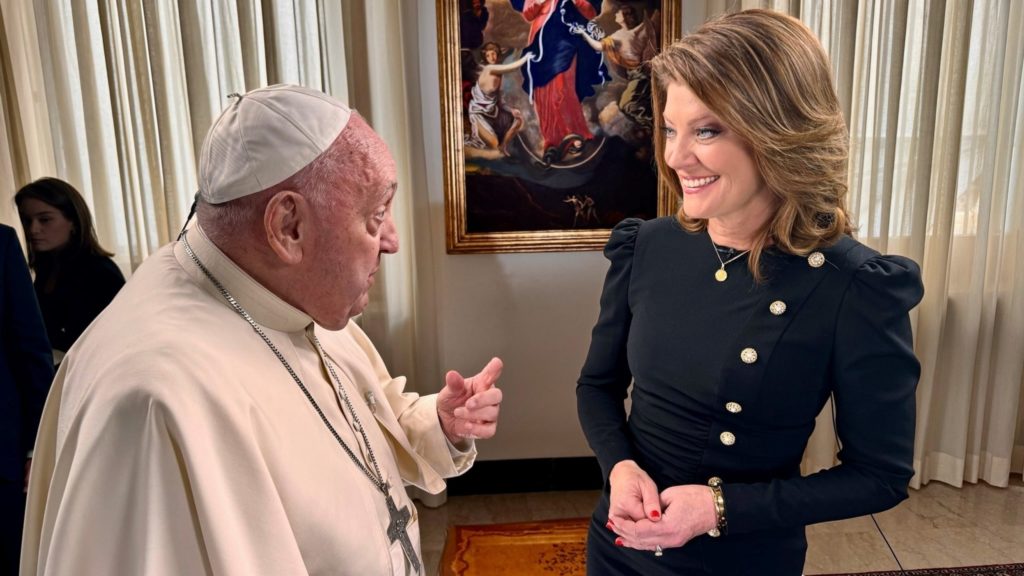ROME — Sometimes the most important aspect of a development isn’t its content, but the fact it happened at all. For instance, when a U.S. president throws out the first pitch at a baseball game, the news generally leads off with his presence, not the fact the throw was low and in the dirt.
One might well apply the same principle to Pope Francis’ recent interview with Norah O’Donnell of CBS, excerpts from which aired on the network’s nightly news April 24, and the full version of which is set for a “60 Minutes” episode on May 19 and then an hour-long prime time broadcast on May 20.
In many ways, the news is not what he said, but rather to whom he said it.
Despite the fact that Francis often seems to be on the “interview a week” plan, with two new book-length interviews appearing in just the past month, this was the first time the pope sat down with an American news anchor for an extended exchange.
At the level of content, there was precious little we haven’t heard before, at least in the excerpts released by CBS in April. Francis repeated his calls for a negotiated peace in both Ukraine and Gaza, saying negotiations are always preferable to a “war without end.” He described, as he often has, his nightly phone calls to the lone Catholic parish on the Gaza strip and the hardships encountered by the people sheltering there.
As he has on many other occasions, the pope also criticized climate change skeptics.
“There are people who are foolish, and foolish even if you show them research, they don’t believe it,” he said. “Why, because they don’t understand the situation, or because of their interest, but climate change exists.”
Also in keeping with previous declarations, Francis insisted that there’s room for everybody in the Catholic Church.
“I would say that there is always a place, always. If in this parish the priest doesn’t seem welcoming, I understand, but go and look elsewhere, there is always a place,” Francis said.
If we put the focus just on the content of the interview, the raw truth is that Francis almost didn’t have to be there. Regulars on the Vatican beat could have delivered his answers from memory, virtually word-for-word, so familiar are they by now.
The fact he said all this to an American network, however, is still noteworthy for a couple of reasons.
First, by this stage in his papacy no one any longer has an accurate count of all the interviews Francis has given over the last 11 years. The conventional tally is “more than 200,” but that’s really just a way of saying it’s a lot. Francis probably has done more media interviews not only than any previous pope, but than all previous popes combined.
The fact that amid this flurry of papal chatter he’d never agreed to talk to an American news anchor, and has only spoken to a handful of American journalists of any sort, stood out like a sore thumb, and has been widely seen in the press corps as confirmation of the pontiff’s ambivalence about the United States.
By agreeing to sit down with CBS, therefore, the pope effectively may have signaled a normalization of his relations with America and Americans, at least as far as the press goes.
Second, Pope Francis showed his media savvy in the interview as well, adroitly side-stepping a couple of possible landmines along the way.
This wasn’t exactly a hard-hitting interview, in part because the ostensible subject was the pontiff’s first-ever World Day of Children set for May 25-26 in Rome. Nonetheless, O’Donnell is a skilled veteran journalist, and for at least a couple of points she gave Francis the opportunity to make some waves.
On Gaza, for instance, here was O’Donnell’s question: “There are now pictures of starving children coming out of Gaza. What about those who call this a genocide?”
It’s important to recall that in November, a mini-tempest erupted when a group of Palestinians who had a private meeting with the pope claimed Francis had called the Israeli incursion in Gaza a “genocide.” A Vatican spokesman issued a mild denial but the Palestinians insisted, so in effect O’Donnell was offering Francis a chance to settle the confusion.
He didn’t bite.
Instead, the pope simply paused, repeated the word “genocide” as if to acknowledge that he’d heard the question, and then began discussing his nightly calls to Gaza. In so doing, he emphasized the suffering going on, but avoided getting drawn into the genocide debate.
At another point, O’Donnell asked Francis, “Do you have a message for Vladimir Putin when it comes to Ukraine?”
The pontiff has faced criticism since the outbreak of the war two years ago for his unwillingness to directly condemn Putin’s aggression, and has occasionally irked Ukrainians by describing Putin instead as a man of culture with whom one can dialogue.
O’Donnell was giving him a chance to take Putin on, but once again the pope demurred.
“Please, in countries at war, all of them, stop the war … look to negotiate, look for peace,” the pope said, clearly unwilling to put the focus specifically on Putin or Russia.
The bottom line from his sit-down with CBS, therefore, is that we saw a pope seemingly wanting to improve his relations with Americans, especially the American media, without creating new headaches with anyone else.
We’ll know for sure in May how well he succeeded, when the full interview airs, but early returns seem promising.

